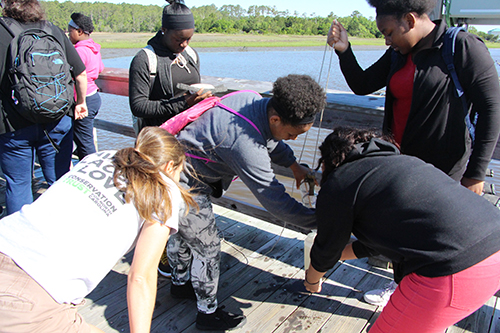Parents Respond to Kids’ Climate Education
Contacts:
Danielle Lawson, dafrank2@ncsu.edu
Kathryn Stevenson, 919/515-2739, ktate@ncsu.edu
Nils Peterson, 919/229-9519, mnpeters@ncsu.edu
Matt Shipman, NC State News Services, 919/515-6386, matt_shipman@ncsu.edu
A new study from North Carolina State University shows that educating children about climate change affects parents as well.
“There’s a robust body of work showing that kids can influence their parents’ behavior and positions on environmental and social issues, but this is the first experimental study demonstrating that climate education for children promotes parental concern about climate change,” says Danielle Lawson, lead author of a paper on the work, who recently completed her doctorate at NC State.
“To be clear, climate change education is about giving people a good foundation in climate science and cultivating critical thinking skills,” says Kathryn Stevenson, co-author of the paper and on faculty for parks, recreation and tourism management at NC State. “This is about education, not activism, and children are great educators. They seem to help people critically consider ways in which being concerned about climate change may be in line with their values.”
The work was done with support from North Carolina Sea Grant, and from the U.S. Department of Interior’s Southeast Climate Adaptation Science Center in the form of a graduate fellowship awarded to Lawson.

For the study, researchers worked with middle school science teachers to incorporate a climate change curriculum into their classrooms. Prior to teaching the curriculum, researchers had 238 students and 292 parents take a survey to measure their levels of concern regarding climate change. Some were then in a control group, while others received the curriculum. All were retested.
“We found that there was an increase in climate concern for both the experimental and control groups, but that the shift was much more pronounced in families where children were taught the curriculum,” Lawson says. Among the findings, daughters appeared to be especially effective in influencing parents.
“This study tells us that we can educate children about climate change and they’re willing to learn, which is exciting because studies find that many adults are resistant to climate education, because it runs counter to their personal identities,” Lawson says.
“It also highlights that children share that information with their parents, particularly if they’re given tools to facilitate communication – and that parents are willing to listen.”
The paper, “Children can foster climate change concern among their parents,” is published in the journal Nature Climate Change. Additional co-authors are Nils Peterson, Sarah Carrier, Renee Strnad and Erin Seekamp, all at NC State.
This story was adapted from a news release originally published by North Carolina State University. For that news release, and an abstract of the study, visit the following link: https://news.ncsu.edu/2019/05/climate-education-for-kids-increases-climate-concerns-for-parents/.
##
- Categories:


